- Home
- Christine Morgan
The Raven's Table: Viking Stories Page 13
The Raven's Table: Viking Stories Read online
Page 13
Soon, his protests unheeded, Osbert was dressed in new clothes—a red wool tunic stitched with gold thread, trousers leg-wrapped in broad ribbons, shoes of kidskin, a cloak trimmed with fur.
“Ah, here he is, here’s the lad!” a man roared, rushing at Osbert with arms wide outstretched.
Osbert flinched back but had nowhere to run, so was hefted at the waist and tossed into the air. The man caught him again, rough-housing him like a dog with a rag, laughing as he did so.
“What’s the matter, boy?” the man asked when Osbert did not laugh with him. “Don’t you know me? Here we both are, and I owe it to you!”
He studied the man—long yellow hair, a full beard—and was astonished to find that he did recognize him. This was the Dane who’d crawled over the pile of corpses, cut from shoulder to thigh… the Dane into whose dying hand he had given over the sword, and from whose dead hand he’d grabbed it up again to face Huldbrynne.
“You…” he said.
It struck him that, before, they had struggled to understand the speech of each other, but now it was as if they all spoke the same tongue.
The yellow-haired Dane, whole now and alive, hale with health and heartiness, laughed again. “But for you, little Umberlander, I would be walking the bleak road to Hel’s realm now! Your kindness helped me win through to Valhalla, and for that, I, Rygg Tyrvyggsson, call you war-brother! Gladly would I have gifted you that arm-ring!”
Rygg set Osbert down, clapped him on the back so hard it nearly sent the boy sprawling, and grinned a joyful flash of white teeth through his woolly blond beard. “So, war-brother, what is your name? Who is your father?”
“Osbert, and… I have none.”
Once more, this was met with less scorn than before. “No matter. Come! Let us enter together into Odin’s great hall!”
“You’re dead,” Osbert managed to finally say.
With another booming laugh, Rygg yanked wide the neck of his tunic. His chest was unmarked by any sign of a wound. Just as Osbert’s own chest—if far scrawnier, hairless and pale—bore no mark from the spear-point.
“This is Valhalla!” he cried, as if that explained all.
If the gold-shingled hall looked imposing from outside, it was mind-staggering viewed from within. The ceiling rose high, crossed with massive oak beams. Firepits ran the center length of the floor, with tables and benches to either side extending as far as could be seen. Along the walls were sleeping platforms piled with blankets and furs, and above each man’s place hung mail, shield, helm, and weapons.
Here there were men by the hundreds, the thousands or more. Warriors and Danes… lords, heroes and kings… great men, and powerful. Even those who’d been, in life, mortal enemies, met again now, embracing as friends. They lifted drink-horns to each other and drained them.
Here there were women as well, golden war-witches such as Huldbrynne and her sisters, but others as well… lascivious women, buxom and willing, their frock-fronts unlaced to display ample cleavage. Osbert, shocked, averted his gaze.
The tumult was louder than battle-clangor—shouts and songs, boasts and laughter. The tables, strong as they were, all but sagged beneath the weight of the feast laid out on them.
Such a feast, Osbert never could have even imagined.
Meat boiled in kettles, so tender it half-melted in the thick broth… meat roasted on spits, juices dripping and the crisped fat crackling… meat minced with fruits, baked into savory pies… the meat of the feast-boar Saehrimnir, Huldbrynne had said, who was butchered and cooked each morning but renewed again each night… what a fate for the poor animal, eternally tortured!
And the mead… the Dane-drink… made not from grapes or grain, as wine and beer were brewed, but from golden honey…
They had bread there as well, used mainly to sop up meat-gravy. There was butter and cheese… there were nut-cakes baked with more honey, and berries drenched in cream…
Everywhere his sight fell he beheld gluttony and lust, pride and intemperance, a plethora of sins!
Men played at board games, and wagered at dice. Some lifted giggling girls into their arms and bore them to the sleeping-places; others took them in rutting right there at the table!
“Eat and drink, little war-brother!” Rygg poured mead from his drink-horn into Osbert’s mouth, and all around them cheered with good-nature as he sputtered and choked.
It coated his throat, and kindled heat in his belly. His eyes watered. His head spun. They urged meat upon him next, which he’d infrequently had at home. Meat was for Sundays, and holy days, except during Lent. He was used to monks’ fare, lentils and brown bread, porridge and fish…
The taste, delicious at first, too quickly came to seem bloodied and burnt. It lay with greasy heaviness in the pit of his gut. His bowels cramped with pain; he was sure he would vomit.
This was Valhalla. This was their feast every night.
By day, Osbert soon learned, the men armed and armored themselves to go out into a vast courtyard where they practiced at war. They must, Rygg explained to him, be ready for the final battle, the conflict at the end of times when the giants and gods would meet, when the world would be wracked by disasters and ultimately drowned.
These men brought here, these known as Einherjar—of which Rygg was one, chosen by Huldbrynne for his valiant death with sword in hand—would fight in that battle. Fight against giants, and monsters…
Peace everlasting, Bishop Cenric had said of God’s Heaven.
One night, as they moved through the crowded feast-hall, Rygg stopped short so that Osbert, following close on his heels, collided with his broad back.
“Here, Osbert War-Brother,” he said, “this, you must see!”
Then he hoisted Osbert up, so that the short boy could peer over the heads of the many tall men.
A great chair—a throne of carved wood, antler, ivory and gold—sat draped with bearskins upon a raised platform. In the chair was a figure of the most fearful aspect, surveying the throngs of warriors at their merriment. He surveyed them with but a single bright eye; the other was gone, leaving a dark socket where some terrible wisdom dwelled. His hair and beard were whiter than snow, his face careworn but stern, lined with age.
Two ravens perched, one on each of his shoulders. Their heads dipped close to his ears in turns, as if muttering secrets. Two wolves, their pelts lush and silver-black, rested by his feet. Huldbrynne and her sisters attended him, replenishing his drink-horn, bringing platters of meat to the wolves.
“Is that…?”
“Odin,” Rygg said.
Suddenly, as if through all this noise Odin had heard them, his one bright eye fixed on Osbert. Both ravens cawed, flapping their black wings. Both wolves pricked their ears, lifting their shaggy heads, yellow eyes gleaming.
“Take the boy to the All-Father,” blonde-braided Sigfridda said, having appeared out of nowhere at Rygg’s elbow.
A hush fell. A path parted as Rygg led him forward. Osbert trembled, close to fainting but trying to be brave. When Rygg stopped, he went the last few paces by himself, and stood before the platform upon which Odin’s throne was. His head bowed, and he wrung the hem of his tunic fitfully in both hands.
“Osbert,” Odin said. “Huldbrynne has told me of you. Your defiance, your courage. So small, but bold. Honorable, as well, giving mercy even to your foes… as was shown by your returning of this man Rygg’s sword to his hand.”
He squirmed at the praise, which felt as ill-fitting as an uncomfortable garment. He blinked away tears, and sought to keep his chin from quivering.
A very long silence passed, drawn out like thread from a spool. Then Odin spoke again. “Are you happy here, Osbert? Satisfied with this fate?”
Lips pressed tight together, he gave a swift shake of his head.
A stirring of disapproval rippled through the crowd around him.
“Why is that?”
At that, he had to muster an answer. “It… it’s pagan, m’lord… the… the ex
cess, and lechery… the sinful wickedness…”
Odin chuckled. “No pious Christian child or reluctant soul should belong in Valhalla. Huldbrynne was in the right to bring you, but I am in the right to send you home.”
Some time previous…
They found Osbert—small, still, and lifeless—among the cold corpses littering the battlefield.
He had no wounds, no injuries. The ravens had not touched him, though they ate their fill of carrion from the others. The worms, flies, and maggots did not yet infest his flesh, though they teemed everywhere else.
Bishop Cenric carried the boy back to the monastery himself, weeping as he did so. He washed the body and set it upon a bier in his council chamber, draped with fine cloth.
For three days, he knelt vigil. He fasted. He did not sleep.
And no change came to the child’s pale flesh.
Uneasy glances, half-fear, half-exultation, passed among the townsfolk and monks.
First the Danes had decided, without word or warning, to withdraw to their longships and sail away instead of pressing another attack.
Then there was Lord Aelfstan, who’d refused to let them cut off his ruined leg although he was sure to die otherwise… but did not, and was making a startling recovery.
Now, this…
None of them wished to say the words in so many of their thoughts—words such as incorruptible, or miraculous—
On the fourth morning since the sorrowful discovery, Cenric was disturbed from his silent grief by a feathery fluttering at the room’s narrow window.
He turned his head to see a black-winged shape fly away, leaving something that shone golden in the dawn sun.
Rising, knees stiff from kneeling, he went to the window.
A gold hoop lay there, a Dane’s arm-ring, worked in a pattern of snake’s-scales, with green jewel chips for its eyes.
Cenric picked it up, examining it curiously.
Behind him, on the bier, the cloth moved as Osbert gasped a breath.
NAILS OF THE DEAD
A corpse-cart comes, heavy-laden and rumbling, wheels churning thick in the muck. The ox plods along with head lowered against rain mixed with spattering sleet.
I wait.
The driver and his boy keep their heads down as well, shabby cloaks wrapped around them, hoods drawn over their gaunt faces.
I wait and I watch.
They pay me no notice. Even the ox is oblivious to my lurking, hidden presence. If they had a dog with them, it might be another matter… some dogs are my friends, some, but by no means all.
The boy coughs. It is a wet, weary sound.
He is plague-stricken.
The sickness spread across the countryside like a savory rumor. Neighbor to neighbor, friend to friend. And, like a rumor grows greater and stronger in the telling, so too did this.
The driver says nothing, makes no gesture of comfort. He nudges the ox with the goad. The beast obligingly turns toward the funeral-pit that was, in days not so long distant, a rocky hollow at the village’s edge.
They have a night of grim work ahead.
So do I.
The cart stops. The driver climbs down. His boy, still coughing, follows. They take hold of an old woman. Her hair trails grey and fine as cobwebs. Her limbs are bony sticks. Her fingers, deep-grooved from a lifetime of distaff and spindle, thread and loom, seem to scratch like hooked claws at the dark-clouded sky.
They lift her, and carry her, and swing her, and let her go.
Down the corpse falls, a stiff and brittle bundle.
Into the pit. One more for the pile.
Birds flap up, protesting at the disturbance. Gulls, mostly; Odin’s ravens, for all they are greedy corpse-pickers, fancy themselves too noble for this feasting bounty. Rats scurry, squeaking and indignant. The lesser carrion-eaters, worms and beetles, go unconcerned about their business.
A child is next.
This is the way of such things. The weakest are often first to succumb… the very old, the very young, the poor and the frail. But, ultimately, no one is safe. Lord or thrall, hall or hovel, no one is safe.
I continue waiting and watching as they unload the cart of its burdens. Bodies tumble like logs. Cold, dead flesh slaps and smacks onto the rain-slick rotting mound below. The stench, already a tangible thing, worsens. The belch and sigh of released gases… decaying organs rupturing upon impact… it is a reeking, pale miasma hanging in the air, felt and tasted as well as smelled.
The boy stumbles, gorge heaving. He does not vomit, but as he gags and retches, he begins again to cough. He coughs until he drops, choking, to his knees. Blood-foam flecks his scabbed lips. The sound is terrible, thin and desperate wheezing gasps between each ragged lung-ripping spasm.
He collapses, face-purpled, watering eyes wide and pleading. His trembling hand outstretches. It is gore-streaked, filthy, grime caked under the nails in thick black crescents.
The driver, with a pained expression, turns away. He puts his back to the dying boy. His shoulders shake. At his sides, his fists clench white-knuckled. He seems to stare unseeing in the direction of the village, where so few thin threads of smoke unspool from chimneys.
Then it is over. A final rasping gurgle escapes the boy’s throat. His body goes limp. Rain washes the bloody foam from his lips. Sleet melts in his eyes.
I watch in great interest.
I am no stranger to death or the dead.
The dying, however, I do not often witness. I follow later, like the rats and gulls, like the worms and beetles, like the proud ravens and those dogs who are not so loyal as to refrain from feeding on the remains of their former masters.
I watch now as the driver covers the boy’s face and wraps him in his cloak. He sets this one aside, treating it far more gently than the others in his care.
Working alone, he resumes the unloading. He lifts those he can, drags or hauls those he cannot. He grunts with effort as he tips the corpse of a large man over the rim of the carrion-pit; it rolls down the slope and lands on the pile with a noise like a sow flop-wallowing in deep mud.
At last, the cart is emptied. The hungry gulls wheeling above voice their approval and impatience. The driver places the boy’s cloak-wrapped body with the others, then returns to his seat and goads the ox back toward home.
When he is gone, it is time for me to do my work.
I descend among the dead. The rats and birds do not flee from my approach; their kind know me of old, and know that I am not here to interfere with their feeding. Indeed, the rats welcome me, because my scavenging helps clear the way for their own.
The rot-stench does not bother me. Nor does the unyielding rigor of flesh, and the clammy feel of skin moist with coagulated oozings. I do not cringe from gaped mouths where worms crawl, or from the maggots that writhe and teem in sockets where sharp beaks have plucked out the milky orbs of sightless eyes. When I find a she-rat has birthed a litter in the eviscerated hollow of a man’s belly, I do not disturb the tiny creatures, naked, pink and squirming.
I pick up the man’s dead hand in mine.
A large hand, tough, strong, powerful, well-callused. The knuckles are scarred. A half-healed cut slices the base of the thumb.
The nails are very good.
Broad and thick, healthy, and long.
Not overly long, not protruding much beyond the tips of the fingers, but long just the same. Untrimmed for some while, several days at least.
Of course. As I had expected, and why I had come.
In times such as this, plague-times or other times of illness, disaster or despair, these little matters often go neglected. There are, folk think to themselves if they think of it at all, far more important matters to attend to. Trimming their finger- and toe-nails can wait. A day more or less, what difference would it make? Then they fall ill, and grow sicker, and die… and those who survive are in no fit state to attend to grooming the dead.
All the better for me, and for my work and purpose.
The tools of my trade, I wear on a ring at my belt. I have many of varying sizes and kinds. They clink and rattle as I move. Iron and silver, antler and tin, whale-ivory, wood, hammered brass and forged steel… from needle-fine pincers to sturdy gripping-tongs such that a blacksmith might use… my belt-ring of tools holds something for every occasion.
I choose the best tool for this, and begin as I always do, with a forefinger. I pry up the nail enough to wedge the bottom jaw underneath, then bear down with careful pressure until I have it in a sure and firm grasp.
Then I pull.
Not slowly, since I have many more yet to do, yet not in a quick rude yank either. The sensation is one as much heard and felt as seen, a peeling separation, the faintest crackle of gristle as it parts from the bloodless blue-grey flesh-bed beneath.
It is a well-practiced pull, a draw clean and smooth as a blade from a sheath.
I hold it up to examine, and nod with satisfaction. No cracks, no splitting of the nail, no breaking… no jagged splinters left sticking up from the nail-bed… I have it entire. I tuck it into the bag slung around my neck.
I move on to the next finger. Then the third, and the smaller fourth. They are all clean pulls. Last, on that hand, I take the thumb-nail. Those, and the nails of the large toes, are always the most well-rooted, the most difficult to extract. They resist with tenacity, often trailing threads of sinewy tissue when they tear loose. Yet they are also the ones of most use and value.
The right hand done, I lower it and pick up the left. Already, whiskered noses twitching, some of the rats creep nearer. Their sharp little yellow teeth, made for chewing and nibbling, are well-suited for the eating of corpse-lips. They gnaw at the ear-lobes and the flared ridges of nostrils, but those parts are tougher, a less satisfying meal.
With the nails tugged from the ends of finger- and toe-tips, they are exposed, soft and unobstructed. The rats may readily strip the meat from the bones, just as a man at a feast-table might devour boiled pork from a pig’s ribs. When I remove boots or shoes to get at the toes, this saves them the trouble of chewing through leather.

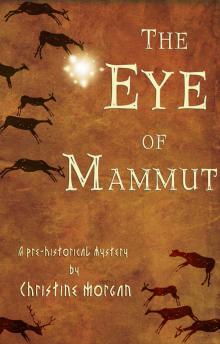 The Eye of Mammut
The Eye of Mammut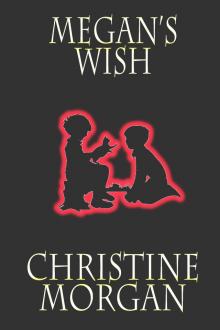 Megan's Wish
Megan's Wish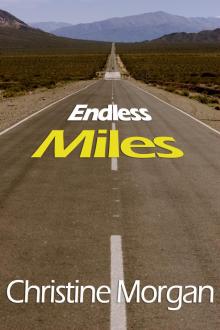 Endless Miles
Endless Miles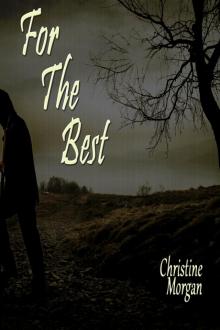 For The Best
For The Best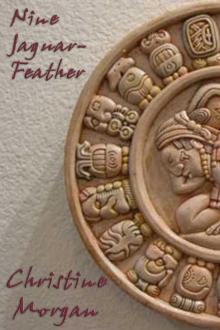 Nine Jaguar-Feather
Nine Jaguar-Feather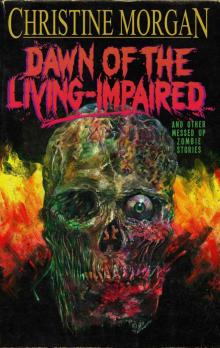 Dawn of the Living-Impaired
Dawn of the Living-Impaired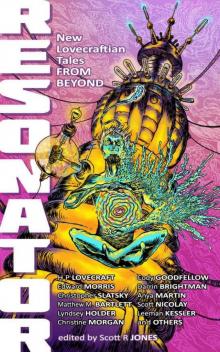 Resonator: New Lovecraftian Tales From Beyond
Resonator: New Lovecraftian Tales From Beyond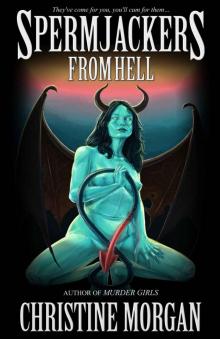 Spermjackers From Hell
Spermjackers From Hell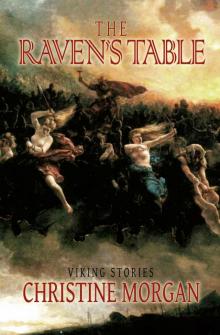 The Raven's Table: Viking Stories
The Raven's Table: Viking Stories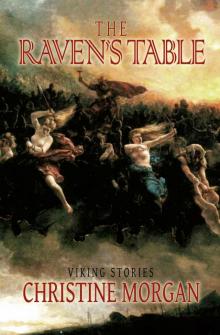 The Raven's Table
The Raven's Table